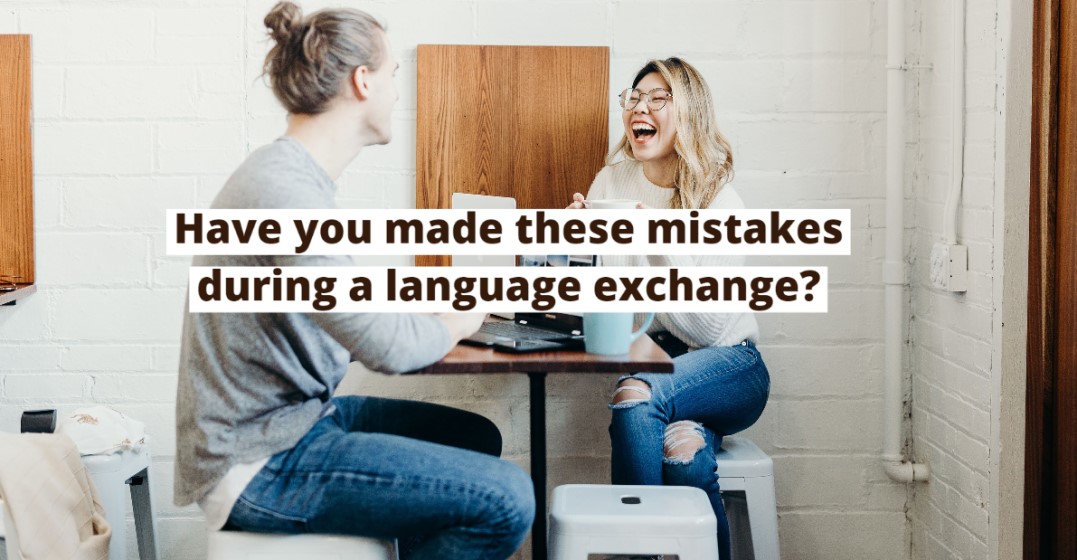Updated on January 8, 2024

7 Mistakes You Should Not Make During a Language Exchange

Attitude, organisation and curiosity: the secret ingredients to great language exchange. With the right mindset, language meetings can be productive, exciting, motivating, inspiring and even a great opportunity to make lifelong friendships! However, it’d be a lie to say that they can never go wrong.
Many of us think of massive, loud gatherings and meetups when it comes to language exchange, but it doesn’t have to be that way. If you’re somebody who prefers an intimate connection, grabbing some coffee and talking about literature, why not schedule a meeting with only one language exchange partner who enjoys the same things you do? Figure out what type of social interaction fits you best and invest in that! There are language exchange opportunities for every type of personality.
There’s no need to create a huge list of goals or define overwhelming terms before showing up at a language exchange meeting. After all, the purpose is to learn a new language and have fun doing it! However, not having any idea what you want to accomplish can lead to your language partner speaking the entire time…and you feeling stuck or lost. Decide beforehand what language you want to practise and what specific weakness you’d like to tackle: is it developing your overall confidence? Sounding a bit more natural? Improving your use of grammar? It doesn’t need to be too specific. A simple goal will do.
Unless English is your target language, avoid starting the conversation with it. This is for a couple of reasons: first of all, it will immediately create a pattern of interaction in this language, making it your diplomatic language. It’ll be very hard to switch from that and make another language your main language of interaction. Secondly, it’ll make it way more difficult for you to suddenly switch to your target language in order to practise. Finally, you’re likely to feel way more awkward transitioning from English to a foreign language than if you start using it immediately!
Remember that you and your language partner(s) have decided to show up for the same reason: you want to practise speaking a language confidently. Don’t be ashamed to tell them what you want! If you realise you’re not practicing enough, ask them directly (“Sorry, do you mind if I speak some Spanish now? I feel like I really need to practise and you could help me with that, too! I usually don’t get many chances to practise”). In the same way, don’t be ashamed to ask people to correct you, your grammar or anything else. You’re here to learn! Give your language partner(s) directions on what they can help you with.
Let’s say you’re having the time of your life speaking to your language exchange partner (or partners!), but need to check some words on your phone once in a while. That’s perfectly normal! The question is: do you take note of the words you’re constantly reaching out for and never remember? Once you get home and some time has passed, do you remember to note those down somewhere? Or maybe create flashcards so you can study them? This can give your vocabulary a huge boost!
Yes, we love language exchange meetings because of the feedback and how much faster we learn. However, some people don’t deal well with others correcting them all the time, especially if they’re interrupting them as they speak. Make sure to ask your language partner if they want you to correct them when they make mistakes before you even start talking. You can also just let them know what they can improve at the end of the exchange.
This is one of the most difficult aspects of language exchange: consistency. We don’t always have the time to commit to regular meetups, online chats and coffee “dates”. But reaching out to our favourite language partners for an occasional meeting or a 30-minute chat is important. Consistency will help us make sure we stay on top of our game, not to mention you’ll notice significant progress when you let go of the awkwardness of the first meetings and feel comfortable with your partner!
Now that you’re aware of the most common obstacles language exchange participants face, are you ready to schedule your next practice online? Just remember: keep your attitude open, your curiosity awake and a couple of things agreed before you begin speaking!